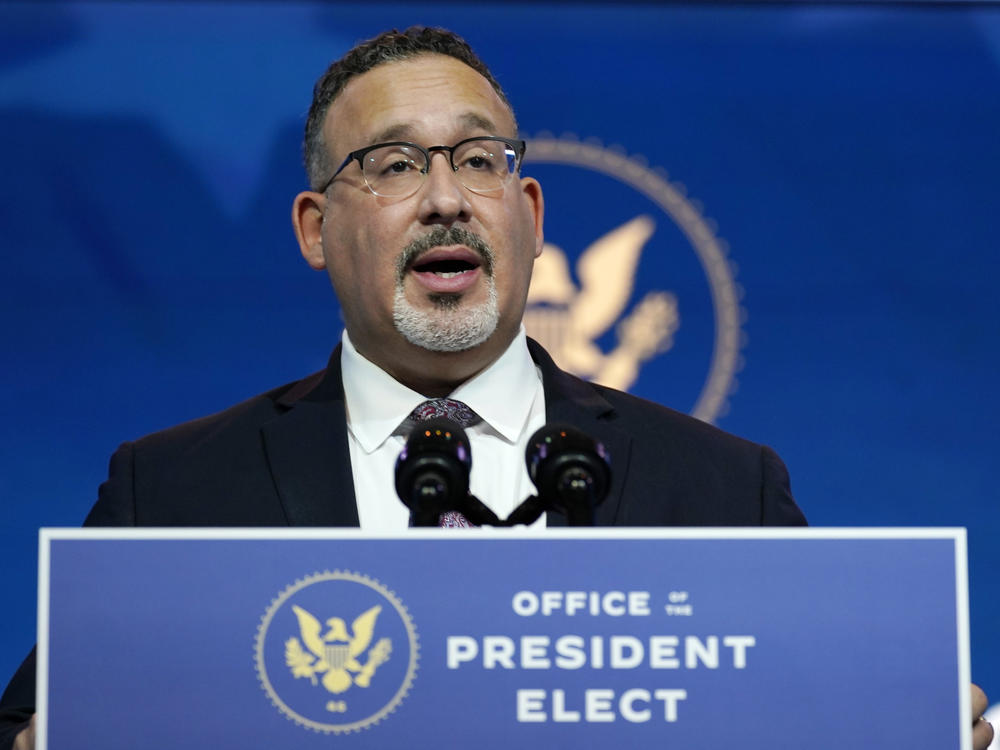Section Branding
Header Content
A 'Real Easy' Choice: Biden Introduces Education Pick Miguel Cardona
Primary Content
In a speech praising educators, President-elect Joe Biden announced Miguel Cardona was a "real easy" choice to be the next secretary of education.
On Wednesday, Biden reiterated his focus on getting schools open amid the pandemic and touted Cardona's experience this fall balancing online and in-person learning in Connecticut, and getting students connected and outfitted with a device for learning. "That's the vision, resolve and initiative, that's all gonna help us contain this pandemic and reopen our schools safely," Biden said.
Biden has long said his education secretary nominee would be a teacher or educator. "We need an education secretary who understands that education isn't just what we do," Biden said, "it's who we are."
An educator, Cardona certainly is. After starting his career as an elementary school teacher, he became a principal for 10 years (he was named Connecticut principal of the year in 2012), and he then became an assistant superintendent in Meriden, Conn., a district just south of Hartford that serves about 9,000 students. It is also where he was born and attended public schools.
In his remarks, Cardona acknowledged what a challenging year this has been for schools. "I've lived those challenges," he said, as both a public school parent and as leader of the public schools in Connecticut. The pandemic, he said, has "taken painful disparities and wrenched them open even wider. ... It has stolen time from our children." In the years to come, he said, "we will carry its impacts."
"It shouldn't take a pandemic for us to realize how important teachers are," he said.
Cardona talked about his background and bilingual upbringing and said he was "American as apple pie and rice and beans." His parents are from Puerto Rico, and he is the third Latino candidate Biden has put forward for a Cabinet post. He lived in public housing as a kid, arrived in kindergarten only speaking Spanish and has long drawn on his personal experience to inform his approach to education policy, focusing on making schools more equitable, closing achievement gaps between students of color and their white peers, and improving teaching for English-language learners.
In Biden's talks with Cardona, they discussed how "public education was the great equalizer."
Cardona would replace Betsy DeVos, the education secretary during the four years of the Trump administration. DeVos has been a big proponent of school choice and often advocated for private and religious schools. Cardona is certainly a rebuke to that. He is a product of public schools, where he's worked his entire career.
That makes teachers union leaders happy. "Miguel Cardona is not just a proud product of public schools — he's made strengthening public education and fighting for equity his life's work," Randi Weingarten, president of the American Federation of Teachers, said in a statement. Lily Eskelsen García, the former president of the National Education Association whom Biden also considered for the secretary position, issued a statement saying, "I proudly support this nomination. ... [Cardona] will defend our students' civil rights and focus on the success of all students."
And it's not just union leaders. Even choice advocates said they too are open to this selection. "Like many whose families came here for a better life, Cardona seems to be driven by hard work, respect for education and family, which is a great start," Jeanne Allen of the Center for Education Reform wrote in a statement. "We hope he will come to embrace fully the notion that such choices for a better life must extend first to the education of our kids."
Cardona's experience is predominantly in K-12 education, so his policy goals for higher education are unclear. But his focus on equity and his support of public colleges has many higher education leaders optimistic.
"His chief passion is access and achievement for low-income, first-generation students of color — and he's been very clear that that includes higher education," said Ted Mitchell, president of the American Council on Education, which represents college presidents.
Copyright 2020 NPR. To see more, visit https://www.npr.org.

